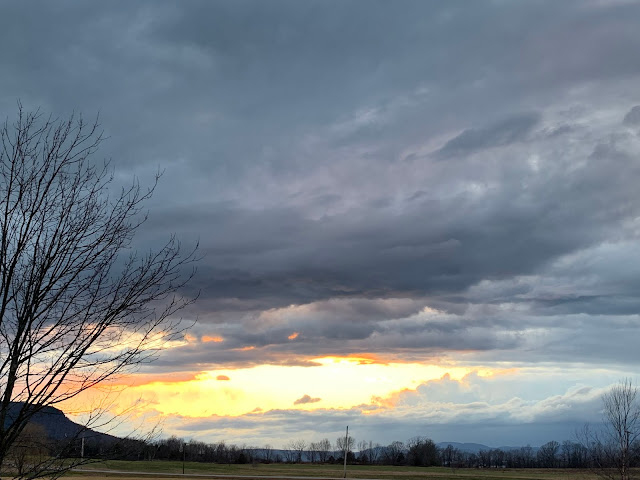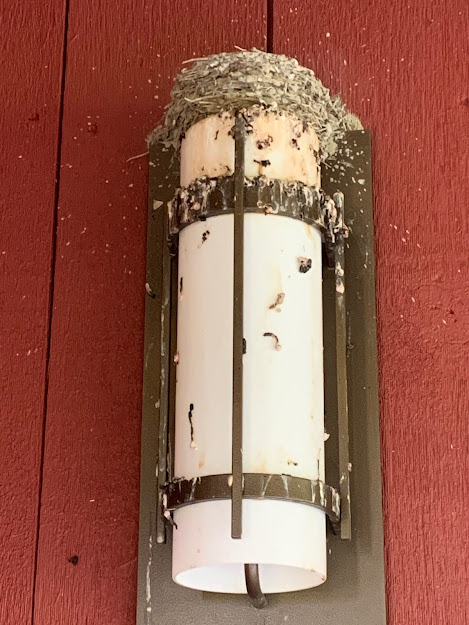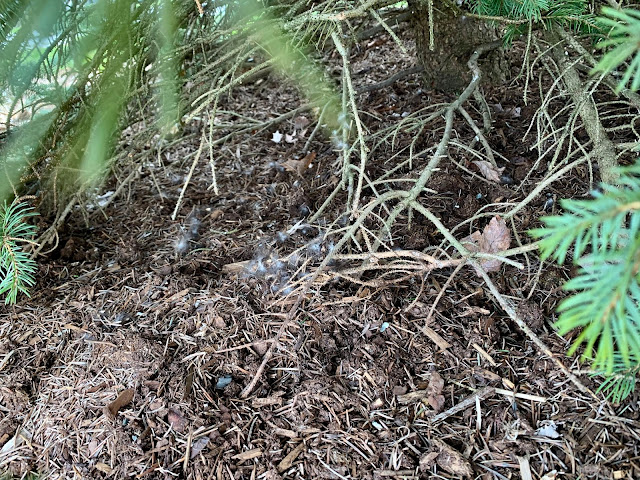 |
| World upside down. . |
A PLAGUE ON US
Plagues have been around as long as there has been a historical record. There was plague in ancient Rome, and probably earlier still. Stories of the bubonic plague that swept through Europe in the mid-1300’s are chilling, but they seem like stories of a time past. We forget. There have been many waves of plagues since, and even the bubonic plague wasn't completely gone after the 1300's but returned in smaller waves thereafter. In the 16th century there was a mysterious “sweating sickness” (its vectors unknown to this day), and cholera, malaria, smallpox, MERS, SARS, ebola and, of course, the flu. The epidemic of 1918 known as the Spanish flu is the one we're most often reminded of. It didn't even orginate in Spain. It happened that during the First World War Spain was the only nation that printed news about the epidemic, other countries being under a news blackout.
Still, who would have imagined there would be an epidemic like this, much less a pandemic, in 2020?
Some people did. Actually quite a few people did.
Seven years ago, 2013:
The World Health Organization (WHO) reports that 75% of all emerging pathogens over the past decade are zoonotic diseases (infectious diseases caused by bacteria, viruses or parasites that spread from animals to humans; think ebola, think Covid-19) most of which are understudied.
Two years ago, 2018:
Bill Gates warns that “If history has taught us anything, it’s that there will be another deadly global pandemic.”
Trump attempts to cut $65 million from the CDC budget, a 10% reduction, and disbands its global health security team.
One year ago, 2019:
The Trump administration’s Department of Health and Human Services runs a simulation called “Crimson Contagion” with a scenario that imagines a flu pandemic, an exercise that runs from January 2019 to August 2019. Its sobering results are to be found in a draft October 2019 report that drives home how underfunded, underprepared and uncoordinated the federal government would be for a life-or-death battle with a virus for which no treatment exists.
The Trump administration proposes to cut federal spending on emerging infectious and zoonotic diseases by 20%. Although Congress reinstates much of this funding with bipartisan support, the overall level of appropriations for relevant CDC programs is still 10% below what the US spent in 2016, adjusting for inflation. (Reference: globalhealthnewswire.com)
TIMELINE: 2020
It began here where I live on March 11. When life began to be lived differently, that is.
December 30, 2019
Dr. Li Wenliang sends a message to his former medical school classmates warning that a handful of patients in Wuhan had symptoms similar to severe acute respiratory syndrome and urges them to be cautious. Dr. Li is vilified for these comments by the Chinese government. I read about this much later on.
December 31, 2019
While New Year’s Eve is passing quietly, unbeknownst to me a report is passed on to the World Health Organization (WHO) from Wuhan, China. It officially informs WHO about a cluster of 41 patients in Wuhan who have developed a mysterious form of pneumonia. Most of those people are connected to the Huyanan Seafood Wholesale Market there.
January 1, 2020
The Huyanan market closes.
January 7
Today Chinese authorities identify a new type of coronavirus and note its symptoms.
It is an ordinary day here in Vermont, but even though it is deep winter there is not much snow on the ground. An ordinary day.
January 11
The day after my birthday the first death from the new virus occurs in China. I read about this in the New York Times. I have dinner with family.
January 12
The first case of this new virus is found outside of China, in Thailand. I read this in the news, too.
January 16, 17, 18, 19
I spend several days in New York City with daughters Lesley and Leah. Lesley and I travel by train from Albany, leaving here in a snowstorm, and meet Leah who arrives by bus from Newburyport. We do many of the things you do when you’re in the city: We spend an entire day at the MOMA, see “Jagged Little Pill” on Broadway, go to a Comedy Club, wander SOHO, eat out. It is the usual, fun kind of New York weekend. New York is normal, great.
January 20
The first US case of this new virus appears in the state of Washington, a man who had been in China. I read about it, but don’t give it much thought although it sounds a bit ominous. It is nice to be back home.
January 22
Trump, in Davos, when asked about the new virus says, “We do have a plan and we think it’s gonna be handled very well, we’ve already handled it very well.” And “It’s one person coming in from China. We have it under control. It’s going to be just fine.”
January 23
My book group meets for what would be the last time for a while. Our next meeting is supposed to be in February, but it is postponed because one member of the group will be in Barcelona around that time.
January 24
There is a regular board meeting of Mountain Health Center. The virus epidemic is not on the agenda. There is no reason it should have been at this time because the virus has not arrived.
Trump says, “China has been working very hard to contain the Coronavirus. The United States greatly appreciates their efforts and transparency. It will all work out well. In particular, on behalf of the American People, I want to thank President Xi!” (Tweet)
January 30, 31
WHO declares a public health emergency, and the next day, Trump bans foreign nationals if they were in China in the previous two weeks. He says, “We’re working very closely with China and other countries, and we think it’s going to have a very good ending for us...that I can assure you.”
February 1
This epidemic still seems to everyone I know as a far-away event. It has no effect on anyone’s immediate plans. This is the day grandson Hans graduates from Middlebury College. Festivities fill the weekend. Hans will stay in Newburyport for about a week and then join his girlfriend in Madison, Wisconsin. He can work remotely, so his physical location doesn’t matter. This will turn out to be fortuitous.
February 7
Chinese doctor Li the whistleblower who first spread the news in China that this was a dangerous virus, dies. The Chinese authorities put the blame for dismissing his concerns on local authorities.
Trump says, “Nothing is easy, but...we will be successful, especially as the weather starts to warm & the virus hopefully becomes weaker, and then gone. Great discipline is taking place in China, as President Xi strongly leads what will be a very successful operation.” (Tweet)
February 8
A US citizen in Wuhan dies, the first death of an American citizen. I am unaware that the speed of the epidemic has picked up. This evening, a frigid night, the Friends of the New Haven Library’s major fundraising event takes place at the Lincoln Peak Vineyard. The virus is not a topic of conversation.
February 10
Trump says, “...by April or during the month of April, the heat, generally speaking, kills this kind of virus.” (Meeting with state governors)
February 11
WHO announces the name of the virus as Covid-19.
February 12
Cases of Covid-19 spike in South Korea.
February 14
The snow is deep and soft right now and the weather beautiful on this winter day. Friends have invited me to a sleigh ride and dinner later that evening at the Inn at Blueberry Hill. The epidemic is not mentioned, neither is it in our thoughts.
February 19
The Iran outbreak begins. Virus coverage in the news is growing.
February 21
Italy’s outbreak begins. On this day I have company visiting from Bedford, Massachusetts, for the weekend. The weather is beautiful again and we take a hike on the peninsula at Kingsland Bay. They leave on the 22nd. (I don't know this yet, but our next face-to-face will be via Zoom.)
February 23
US has 51 confirmed cases. Trump says, “We’re very much involved. We’re very–very cognizant of everything going on. We have it very much under control in this country.”
February 24
I go to my regular monthly Mountain Health Center Board meeting. The virus is not on the agenda.
Trump says, “The Coronavirus is very much under control in the USA. We are in contact with everyone and all relevant countries. CDC & World Health have been working hard and very smart. Stock Market starting to look very good to me!” (Tweet)
February 26
Trump says, “I was really amazed, and I think most people are amazed to hear it: the flu, in our country, kills from 25,000 people to 69,000 people a year. That was shocking to me. And, so far, if you look at what we have with the 15 people and their recovery, one is–one is pretty sick but hopefully will recover–but the others are in great shape. But think of that: 25,000 to 69,000...”
“And again, when you have 15 people, and the 15 within a couple of days is going to be down to close to zero, that’s a pretty good job we’ve done” (White House briefing)
February 27
Trump says, “It's going to disappear. One day it's like a miracle, it will disappear.”
February 28
My family, my nearby neighbors, return from a week in Key West. They say they feel fortunate to have slipped in this vacation before the virus made its appearance. Nevertheless, it was clear to them that it might be coming.
February 29
The Dana auditorium at Middlebury College is full as it usually is for these first-run–free!–films. I think I may go and see the one that’s on next week.
The first death in the US from Covid-19 is reported. This doesn’t sound good, but it’s still far away, in Washington state.
Trump says, “And we've done a great job. And I've gotten to know these professionals. They're incredible. And everything is under control. I mean, they're very, very cool. They've done it, and they've done it well. Everything is really under control.” (Conservative conference in Maryland.)
March 3
Cases in Spain increase dramatically.
March 4
I go to the New Haven Library for our monthly meeting. We joke about never wanting to go on cruises. (Cruise ships have been hotbeds of Covid-19 spreading.) As long as we don't do that we're safe, right?
Trump says, “Large portions of the world are very safe to fly. So we don't want to say anything other than that.” (Meeting with airline executives)
March 6
At my house other members of the Mountain Health Executive Committee meet. The topic of discussion is not the virus, although it is in our thoughts. The chairperson has a bad cold, but we know it’s not the virus because Covid-19 hasn’t arrived in our area–yet. But there are few tests available, so of course no one knows for sure.
Trump says, “Anybody that wants a test can get a test. ... The tests are all perfect.” (at CDC Headquarters)
March 7
My book group meeting is indefinitely cancelled. The member who went to Barcelona and her husband returned with colds. I wonder: Could it be Covid-19? (They don’t get checked for Covid-19 until the end of this month by which time their colds are gone; they wait almost a week for results that come back negative.)
A friend and I go to a concert at the music barn in Brandon. We take a wrong turn so we are late and the only remaining seats are two extra chairs way in the back. The guitarist is from Italy, and I’m thinking about the virus raging there. He said he now lives in New Jersey, but I’m wondering how long he’s been away from Italy. We are the first to leave because my car is blocking other cars, so there is no chatting with the guitarist or anyone else on the way out. (In retrospect this seemed wise).
March 9:
Trump says, “So last year 37,000 Americans died from the common flu. It averages between 27,000 and 70,000 per year. Nothing is shut down, life & the economy go on. At this moment there are 546 confirmed cases of CoronaVirus, with 22 deaths. Think about that!" (Tweet)
March 11
WHO declares the virus a pandemic.
Italy is on lockdown. Trump says, “To keep new cases from entering our shores, we will be suspending all travel from Europe to the United States for the next 30 days.”
March 13
A national emergency is declared in the US. There have been 40 deaths and there are 2,700 confirmed cases.
Trump says, “We have 40 people right now. Forty. Compare that with other countries that have many, many times that amount. And one of the reasons we have 40 and others have — and, again, that number is going up, just so you understand. And a number of cases, which are very small, relatively speaking — it's going up. But we've done a great job because we acted quickly. We acted early. And there's nothing we could have done that was better than closing our borders to highly infected areas.”
March 15
Social distancing begins.
March 17
A Federal plan is leaked that warns the pandemic could last months.
March 18
There is an earthquake in Utah. It knocks Gabriel’s horn from atop the Morman temple in Salt Lake City. No one outside of Utah seems to be aware this has happened.
Trump says Covid-19 is “the Chinese virus.”
March 19
China reports that the local spread numbers of Covid-19 cases are down.
Trump call Covid-19 "the Chinese virus" again.
March 20
Japan postpones the summer Olympics until 2021.
Trump says, "The world is paying a big price for what they (China) did."
March 22
An earthquake happens in Zagreb, Croatia. I was there on March 31, 2019. This is yet another almost unremarked-upon event.
March 23
Our Mountain Health Board meeting is held via Zoom. The agenda is almost solely Covid-19 and MHC preparedness. All medical encounters are now held remotely. Virus testing, however, is limited. They apparently have sufficient Personal Protective Equipment (PPE).
New York City confirms 21,000 cases.
March 24
A Vermont stay-at-home order for the state (There are 95 cases in Vermont.)
My activities fade to near zero. Every day is like Groundhog Day except for changes in the weather.
Trump says, re social distancing guidelines in parts of the country.” “I would love to have the country opened up and just raring to go by Easter.” And: “I think Easter Sunday – you'll have packed churches all over our country.” (Fox News town hall)
March 26
US number of confirmed cases reaches 82,404, surpassing China and Italy.
March 29
Trump says, “The better you do, the faster this whole nightmare will end. Therefore, we will be extending our guidelines to April 30th to slow the spread. ... We can expect that, by June 1st, we will be well on our way to recovery. We think, by June 1st, a lot of great things will be happening.”
March 31
More than one-third of humanity is under some degree of lockdown.
80% of US is under lockdown in 35 states. There is no national lockdown order, however.
Trump says, “But it's not the flu. It's vicious. When you send a friend to the hospital and you call up to find out, how is he doing, it happened to me. Where he goes to the hospital, he says goodbye, sort of a tough guy, little older, little heavier than he'd like to be, frankly. And you call up the next day, 'how's he doing?' And he's in a coma? This is not the flu.” (White House briefing)
April 1
Nearing 1 million cases world-wide. The number of US cases leads the world.
Trump says, “Did you know I was No. 1 on Facebook? I just found out I was No. 1 on Facebook. I thought that was very nice for whatever it means.” (White House briefing)
April 3
Trump: “I said it was going away – and it is going away.” Also: “I would leave it (PPE) up to the Governors.” (White House briefing)
Jared Kushner, now also in charge of the emergency supply chain says, “And the notion of the federal stockpile was, it’s supposed to be our stockpile. It’s not supposed to be the states’ stockpiles that they then use.”
Re the CDC recommendation to wear masks, Trump says, “I don’t think I’m going to be doing it.”
April 4
The US now has 322,632 confirmed cases, triple those in Spain and Italy.
Re hydroxychloroquine sulfate (malaria drug with unproven effectiveness for Covid-19)*, Trump says, “What do you have to lose? Take it.” “I really think they should take it. But it’s their choice. And it’s their doctor’s choice or the doctors in the hospital.” And: “We’re going to be distributing it through the Strategic National Stockpile, we have millions and millions of doses of it.”
And “There will be a lot of death” in “the toughest week.”
And, regarding Easter, “Maybe we could allow special [gatherings] for churches.”
Good luck to us all.
* National Institute of Allergy and Infectious Diseases Director Dr. Anthony Fauci, specifically warned what further studies are needed to determine whether the drugs touted by the president will work against COVID-19. We still need to do the definitive studies to determine whether any intervention not just this one, is truly safe and effective.”








































